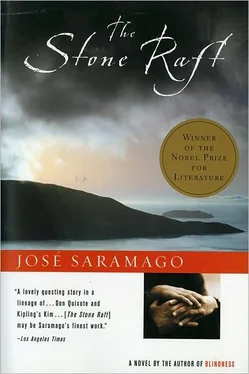José Saramago - The Stone Raft
Здесь есть возможность читать онлайн «José Saramago - The Stone Raft» весь текст электронной книги совершенно бесплатно (целиком полную версию без сокращений). В некоторых случаях можно слушать аудио, скачать через торрент в формате fb2 и присутствует краткое содержание. Год выпуска: 1996, ISBN: 1996, Издательство: Houghton Mifflin Harcourt, Жанр: Современная проза, на английском языке. Описание произведения, (предисловие) а так же отзывы посетителей доступны на портале библиотеки ЛибКат.
- Название:The Stone Raft
- Автор:
- Издательство:Houghton Mifflin Harcourt
- Жанр:
- Год:1996
- ISBN:9780156004015
- Рейтинг книги:5 / 5. Голосов: 1
-
Избранное:Добавить в избранное
- Отзывы:
-
Ваша оценка:
- 100
- 1
- 2
- 3
- 4
- 5
The Stone Raft: краткое содержание, описание и аннотация
Предлагаем к чтению аннотацию, описание, краткое содержание или предисловие (зависит от того, что написал сам автор книги «The Stone Raft»). Если вы не нашли необходимую информацию о книге — напишите в комментариях, мы постараемся отыскать её.
José Saramago was born in Portugal in 1922. He is the author of six novels, including Baltasar and Blimunda and The History of the Siege of Lisbon, Blindness, and All The Names. His backlist is available in Harvest editions.
The Stone Raft — читать онлайн бесплатно полную книгу (весь текст) целиком
Ниже представлен текст книги, разбитый по страницам. Система сохранения места последней прочитанной страницы, позволяет с удобством читать онлайн бесплатно книгу «The Stone Raft», без необходимости каждый раз заново искать на чём Вы остановились. Поставьте закладку, и сможете в любой момент перейти на страницу, на которой закончили чтение.
Интервал:
Закладка:
This was the memorable day on which the latest recorded measurements placed the already remote Europe at a distance of some two hundred kilometers, a Europe that found itself shaken from top to bottom by a psychological and social convulsion that seriously endangered its identity, deprived at that decisive moment of its very foundations, of those individual nationalities so laboriously created over the centuries. Europeans, from the power elite to ordinary citizens, soon became accustomed, one suspects with an unspoken feeling of relief, to the lack of any territories to the extreme west, and if the new maps, rapidly circulated to bring the public up to date, still provoked some dismay, it could only have been for aesthetic reasons, that indefinable feeling of disquiet people must have experienced and still experience today when they see that there are no arms on the Venus of Milo, for that is the precise name of the island where the statue was found, So Milo is not the sculptor's name, No sir, Milo is the island where the poor creature was discovered, she rose from the depths like Lazarus, but no miracle occurred to make her arms grow again.
As the centuries pass, if they continue to pass, Europe will no longer remember the time when she was great and sailed the seas, just as we today can no longer imagine the Venus with arms. Obviously, one cannot ignore the disasters and sorrows that continue to plague the Mediterranean with high tides, the coastal cities destroyed at their maritime fringe, hotels that once had steps leading down to the beach and now have neither steps nor beach, and Venice, Venice is like a swamp, the piles supporting it threatened with collapse, the tourist boom is over, my friends, but if the Dutch should set to work quickly, within several months the city of the doges, the Aveiro of Italy, will be able to reopen its doors to the anxious public, much improved, no longer in danger of catastrophic flooding, for the systems of balancing sluice valves, dikes, locks, pressure and suction pumps will ensure a constant water level, now it's up to the Italians to assume responsibility for reinforcing the city's foundations, otherwise Venice will end up tragically, burying itself in the mud, the most difficult part, permit me to say, is under way, let us give thanks to the descendants of that brave lad who, with just the tender tip of his index finger, prevented the town of Haarlem from disappearing from the face of the earth, destroyed by flooding and deluge.
The restoration of Venice will also afford a solution for the problems facing the rest of Europe. This fascinating region has been stricken time and time again by plague and war, earthquakes and fires, only to rise again from dust and ashes, transforming bitter suffering into sweet existence, barbaric lust into civilization, a golf course and a swimming pool, a yacht in the marina and a convertible on the quayside, man is the most adaptable of creatures, especially when it is a question of moving up in the world. Although it may not be very polite to say so, for certain Europeans, seeing themselves rid of those baffling western nations, now sailing adrift on the ocean, where they should never have gone, was in itself an improvement, a promise of happier times ahead, like with like, we have finally started to know what Europe is, unless there still remain other spurious fragments that will also break away sooner or later. Let us wager that we will ultimately be reduced to a single nation, the quintessence of the European spirit, a simple and perfect sublimation, Europe, namely, Switzerland.
But if there are such Europeans, there are others as well. The race of the restless, the devil's spawn, but not so easily extinguished, however much the soothsayers may wear themselves out with prophecies, all those who watch the train passing and grow sad with longing for the journey they will never make, all those who cannot see a bird in the sky without feeling the urge to soar like an eagle, all those who, seeing a ship disappear over the horizon, give a tremulous sigh from the bottom of their hearts, in their rapture they had thought it was because they were so close, only to realize it was because they were so far apart. It was thus one of those restless nonconformists who first dared to write the scandalous words, Nous aussi, nous sommes ibériques, he wrote them on a corner of the wall, timidly, like someone who is still unable to express his desire but cannot bear to conceal it any longer. Since the words were written, as you can see, in the French language, you will think this happened in France, all I can say is, Let each man think what he will, it could also have been in Belgium or Luxembourg. This inaugural declaration spread rapidly, it appeared on the façades of large buildings, on pediments, on pavements, in the subway corridors, on bridges and viaducts, the loyal conservatives of Europe protested, These anarchists are mad, it is always the same, the anarchists are blamed for everything.
But the saying jumped frontiers, and once it had jumped them it became clear that the same thought had already appeared in other countries, in German Auch wir sind iberisch, in English We are Iberians too, in Italian Anche noi siamo iberici, and suddenly it caught fire like a fuse, ablaze all over the place in letters of red, black, blue, green, yellow and violet, a seemingly inextinguishable flame, in Dutch and Flemish Wij zijn ook Iberiërs, in Swedish Vi ocksâ aro iberiska, in Finnish Me myôskin olemme iberialaisia, in Norwegian Vi ogsâ er iberer, in Danish Ogsâ vi er iberiske, in Greek Eímaste íberai ki emeís, in Frisian Ek Wv Binne Ibeariërs, and also, although with ostensible reticence, in Polish, My też jeteśmy iberyjczykami, in Bulgarian Nie sachto sme iberytzi, in Hungarian Mi is ibérek vagyunk, in Russian Mi toje iberitsi, in Rumanian Si noi'sîntem iberici, in Slovak Ai my sme iberčamia. But the culmination, the climax, the crowning glory, a rare expression we're not likely to repeat, was when on the Vatican walls, on the venerable murals and columns of the Basilica, on the plinth of Michelangelo's Pietà, inside the dome, in enormous sky-blue lettering on the hallowed ground of St. Peter's Square, that same declaration appeared in Latin, Nos quoque iberi sumus, like some divine utterance in the majestic plural, a Mene, mene, tekel upharsin of the new era, and the Pope, at the window of his apartments, blessed himself out of sheer terror, made the sign of the cross in midair, but to no avail, for this paint is guaranteed to last, not even ten whole congregations armed with steel wool, bleach, pumice stones, scrapers, solvents for removing paint would suffice to erase those words, they would have work enough to keep them busy until the next Vatican Council.
From one day to the next, these slogans spread throughout Europe. What probably started as little more than the futile gesture of an idealist gradually spread until it became an outcry, a protest, a mass demonstration. Initially, these manifestations were dismissed with contempt, the words themselves treated with derision. But it wasn't long before the authorities became concerned about this course of events, which could not be blamed on interference from abroad, also a source of much subversive activity, at least the homegrown nature of the graffiti campaign saved the authorities the trouble of investigating and naming the foreign power they had in mind. It had become the fashion for subversives to parade through the streets with stickers in their lapels or, more daringly, stuck on their front or back, on their legs, on every part of their body and in every conceivable language, even in regional dialects, in various forms of slang, finally in Esperanto, but this was difficult to understand. A joint strategy of counterattack adopted by the European governments consisted of organizing debates and roundtable discussions on television, mainly with the participation of people who had fled the peninsula when the rupture was complete and irreversible, not the unfortunate people who had been there as tourists and who, poor things, still had not recovered from the fright, but the so-called natives, more precisely those who, despite close ties of tradition and culture, of property and power, had turned their backs on this geological madness and opted for the physical stability of the continent. Speaking with deep compassion and knowledge of the facts, these people painted a black picture of the Iberian situation, they offered advice to those restless spirits who were unwisely about to put Europe's identity at risk, and each of them ended his turn in the debate with a definitive phrase, staring the spectator in the eye and assuming an attitude of utter sincerity, Follow my example, opt for Europe.
Читать дальшеИнтервал:
Закладка:
Похожие книги на «The Stone Raft»
Представляем Вашему вниманию похожие книги на «The Stone Raft» списком для выбора. Мы отобрали схожую по названию и смыслу литературу в надежде предоставить читателям больше вариантов отыскать новые, интересные, ещё непрочитанные произведения.
Обсуждение, отзывы о книге «The Stone Raft» и просто собственные мнения читателей. Оставьте ваши комментарии, напишите, что Вы думаете о произведении, его смысле или главных героях. Укажите что конкретно понравилось, а что нет, и почему Вы так считаете.












